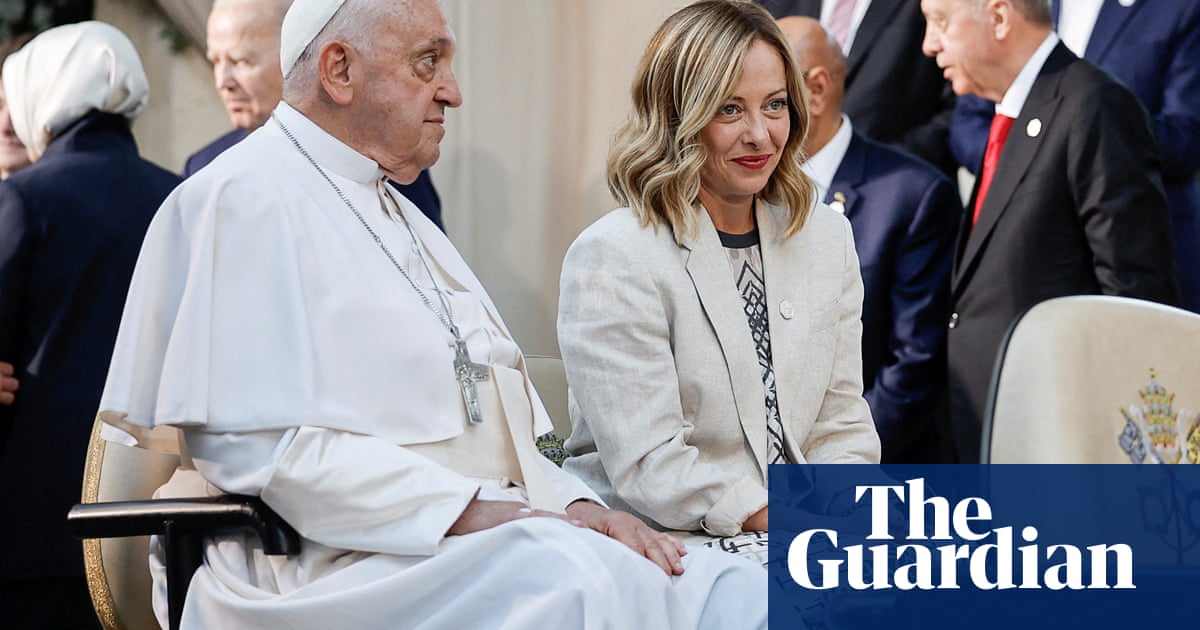It is an awkward weekend forGiorgia Meloni. The Italian leader will host a gathering of world leaders to say goodbye to a much-revered pope whose public views – from the treatment of people fleeing war to the climate crisis – were diametrically opposed to hers.
WhilePope Franciswas a staunch advocate for asylum seekers, and blessed the vessels that saved refugees at sea, Meloni once said Italy should “repatriate migrants back to their countries and then sink the boats that rescued them”.
Close allies of Meloni are attending, including the US president, Donald Trump, who Francissharply criticised for his anti-immigration stance, saying: “Anyone who only wants to build walls and not bridges is not a Christian.” Also flying in is Argentina’s president, Javier Milei, who at various times called the pontiffan imbecile and a representative of the “evil one”.
In ajoint session of parliament on Wednesday, Meloni cited how the pope “gave back a voice to those who did not have one”.
The words of Italy’s prime minister were sharply criticised by opposition parties in parliament. The leader of the centre-left opposition Democratic party,Elly Schlein, said: “Francis does not deserve the hypocrisy of those who deport migrants, take money from the poor, deny the climate emergency and deny care to those who cannot afford it.”
The former Italian prime minister Matteo Renzi of Italia Viva was equally scathing. “It is very funny that each of us seeks to grab a little piece of his legacy,” he said.Addressing the government’s members, he added: “Your detention camps for migrants were a disgrace to Pope Francis.”
On big issues, Meloni and the pope could not have been further apart. The climate emergency was for Francis a moral and spiritual crisis demanding a radical and systemic response, whereas for Meloni the ecological transition is subordinate to economic competitiveness and national interest.
In economics, the pope denounced the “culture of waste”, criticising a system that values people according to their productivity and calling for an economy in the service of human dignity. Meloni, meanwhile, has abolishedsubsidies for the poorand cut healthcare.
“There was a huge gap between the two,” said Francesco Galietti, the founder of Policy Sonar, a political consultancy in Rome. “Meloni bet on Atlanticism, on a close rapport with Trump, while Bergoglio [Pope Francis] was by no means pro-American nor a friend of Trump. There was also a divergence in geopolitical vision: Francis pursued a policy of rapprochement with China, whereas under MeloniItaly withdrew from Beijing’s ambitious belt and road initiative.”
But on a personal level, they appeared to be friendly, even friends.
“Despite this,” Galietti added, “the friendship between Meloni and the pope was allegedly genuine. They spoke in Spanish and met often. This should come as no surprise: after all, the pope, who grew up under Argentina’s Videla dictatorship, was forced to coexist with generals in uniform far to the right of Meloni.”
Melonihas long publicised her personal rapport with Francis, frequently citing details of their conversations in public speeches. Many political observers and media outlets described the prime minister’s strategy as an“operazione simpatia”, an attempt to win over her electorate by highlighting her friendship with one of the most beloved pontiffs.
With the death of Francis, Meloni has lost someone politically, and possibly personally, important to her.
“Francis accepted Meloni’s history, her self-portrayal as an underdog,” said Prof Alberto Melloni, a church historian at the University of Modena-Reggio Emilia and the Unesco chair on religious pluralism and peace. “Once Bergoglio told me he liked the PM because she was ‘a woman of the people’.”
The professor said the crucial question for Meloni was whether the next leader of the Catholic church would also play a useful role. “If the pope does not sympathise with them, he won’t let them off so lightly.”
